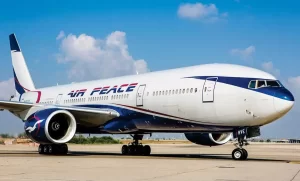Once upon a time last year, I sat at the London Gatwick Airport waiting for an EasyJet flight to Aberdeen, Scotland. Seeing how good and well-maintained an airport could be, I was momentarily lost in thought about our own airports until brought back to consciousness by an announcement on the airport’s public address system.

“Air Peace from Lagos has just arrived,” the voice of the female announcer on the public address system boomed clearly. Everybody at Gatwick heard that Air Peace flight had arrived.
As a Nigerian, that announcement gladdened my heart. It felt good that the world, represented by all passengers, airline crews and officials at Gatwick, had heard that a Nigerian carrier had touched down at the airport, with passengers from Lagos, Nigeria. It was a feeling of national pride.
Although a privately-owned company, Air Peace is an airline that should make every Nigerian proud. The company is a beacon of national pride and a testament to Nigeria’s growing influence in the global aviation industry, symbolising resilience, innovation and excellence.
Air Peace represents Nigeria’s capability to compete internationally, showcasing the country’s aviation prowess and boosting its global reputation. By operating international and sub-regional routes, like Lagos-London and Abuja-London flights as well as Nigeria-West Coast, Air Peace is playing a big role in fostering cultural and commercial exchange, connecting Nigeria to the world.
Air Peace’s growth reflects determination and adaptability in Nigeria’s aviation sector. It highlights commitment to cultural identity and service excellence by serving Nigerian cuisine and making customer experience a priority. That Air Peace has, in 10 years, successfully blended national pride with business acumen, to become, unargueably, the biggest airline in West Africa, clearly makes this statement germane: Something good can come out of Nigeria.
During the COVID-19 pandemic in 2019 and 2020, Air Peace made Nigeria proud, flying the country’s flag, as it were, to bring medical supplies to the country and delivering also to other nations. Air Peace had evacuated Nigerians from other countries in times of need. The airline shapes Nigeria’s sense of self and national heritage.
One, therefore, is always taken aback when certain attitudes of Nigerians, as a people, and government or regulatory agencies, as organisations, seem to suggest that we do not really understand the symbolism of some things or institutions. If we do, we would not handle things relating to a company like Air Peace the way we do.
One often sees video recordings of Nigerians about Air Peace operations done with bad intentions. They talk about flight delays. They talk about flight cancelations. They talk about high fares. They talk about many things regarding Air Peace, many of them true and others exaggerated. Inasmuch as Air Peace has its shortcomings, as any other airline in the world, some of the video recordings and social media posts against the airline are borne out of mischief and ignorance.
No doubt, flight delays, for instance, are annoying. However, they are legitimate in aviation operations. Delays could be as a result of bad weather, air traffic congestion or mechanical issues, which are safety-related. Also, delays could be caused by VIP movements, which require the shutting of airspace to commercial flights for that moment.
It is always funny when passengers who experience flight delays owing to the above listed begin to make social media comments/posts and conclude that an airline, nay, Air Peace, has left them stranded at the airport, presenting it as deliberate. Such passengers fail to understand that once the first flight of any airline is delayed, over weather or other sundry reasons, the rest of the flights for that day would be delayed by the number of minutes or hours of the first delay.
I have noticed that Air Peace suffers more in this kind of misguided posts, which sometimes make it look like an orchestrated attempt to run the airline down. Many people have observed that, had Air Peace been the airline involved in the Comfort Emmanson and Ayinde Marshal saga, Nigerians would have roasted the airline alive. Good for Air Peace, it was not involved in any way in the two ugly incidents.
Discernible minds were taken aback recently when Air Peace was put on the cross because of the indiscretion of one of the regulatory bodies in the aviation sector. The Nigerian Safety Investigation Bureau (NSIB), under the Nigerian Civil Aviation Authority (NCAA), which plays a pivotal role in ensuring aviation safety and regulating airlines in Nigeria, released a report, which was capable of rocking the boat, jeopardise the operations of Air Peace, and perhaps bring about distress.
An excursion incent involving Air Peace happened at the Port Harcourt airport, in Rivers State, on July 13, 2025. Air Peace aircraft landed long of the runway, touching down 2,264 metres from the threshold and veering off the runway. As expected, NSIB swung into action, with the view to finding out why this happened, even though there were no casualties. Such investigation was legitimate and desireable.
However, concerns have been raised about the NSIB’s handling of the investigation, particularly regarding transparency and timeliness. There’s criticism that the responses to airline infractions, like those of Air Peace, sometimes appear slow, potentially undermining passenger trust and safety.
Test samples were taken from cabin crew members of Air Peace who operated the flight of July 13, 2025, to Port Harcourt as is done when there is long landing by an aircraft or done randomly to ascertain that cabin crew members are compliant with alcohol and drug use rules.
Since medical test are conducted by a designated medical facility and results usually produced within days, one expected that release of the preliminary report by NSIB should be within 30 days of the incident. However, it took NSIB two months to release its preliminary report on the Air Peace incident in Port Harcourt.
The report has caused a controversy, which has put a blight on it. The NSIB report said that the medical tests of the cabin crew members came out positive of alcohol and drugs. The agency never informed Air Peace of this. It rather went ahead to make public the report.
However, staff of Air Peace involved have given their own side of the story. One cabin crew member, Victory Maduneme, who said she was shocked to hear that the first medical test on her revealed traces of marijuana in her system. She challenged the result and was subjected to a reconfirming medical test, whose result was negative.
The question is: Why did the NSIB only report the result of the first test and ignore that of the second and reconfirming test? Why was the agency silent about the second test? Why did the agency not inform Air Peace that the test on its pilots and cabin crew members revealed traces of alcohol and drugs, so that those involved could be taken off flights for some time? Why did the agency wait for two months to make the report public?
My research on marijuana tests reveals that traces of the substance remain in the system for 90 days. Yes, while blood test can only dictate traces of marijuana in the system for only days, hair test reveals traces within 90 days. Air Peace cabin crew Maduneme said the doctor told her about the 90 days window and that her reconfirming test was done within one month and came out negative. Usually, reconfirming test results supersede the initial one. But NSIB ignored the result of the reconfirming test and based its report on the first one.
It is the responsibility of regulatory agencies in the aviation sector to ensure compliance and safety. In the discharge of their duties, there is need for thoroughness. Shoddy jobs erode trust and could cause more harm than the intended good. The NSIB preliminary report about the Air Peace excursion incident in Port Harcourt, with its tardiness, has cast a slur on the airline and also on the sector generally. If the report was on solid ground, there would not be a basis for complaint. But where there are holes, this leaves much to be desired.
Air Peace has done much for the aviation sector and the economy. Even though not a national carrier, the airline still flies Nigeria’s flag. Anywhere it flies, the name of Nigeria resonates. This week, the airline announced the offer of 1,000 Graduate Trainee Programme jobs, as response to the suspension of 4 per cent Free-on-Borad (FOB) levy in the aviation sector. Air Peace has more than 3,000 people on its employ and has the capacity to engage more workers as its operations expand.
As Nigerians, what we owe Air Peace is patronage support, in a choice between it and foreign airlines on the routes it operates, among others. The government owes it support in business incentives and business-friendly policies and signing of more Bilateral Air Services Agreements (BASA).
A strong Air Peace is good for Nigeria. An Air Peace, which operates flights to many international destinations, making Nigeria a hub, will expand the influence of the country in global aviation industry. It will reduce cash repatriation by foreign carriers and conserve our foreign reverses.





